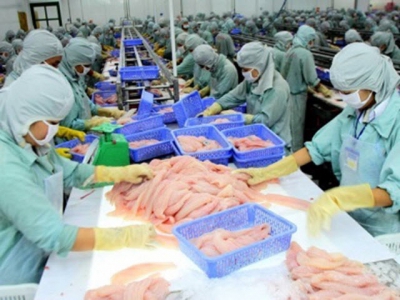Vietnamese pangasius exporters urged not to panic as China conducts additional inspections

The Vietnam Association of Seafood Exporters and Producers (VASEP) has asked pangasius companies to stay calm as their export cargoes began piling up at Chinese ports due to the latter’s increased inspections on imported frozen seafood.
In a statement released on 30 November, VASEP said since 10 November, at major Chinese ports, customs authorities are now testing all frozen seafood cargoes for the coronavirus. As a result, cargoes of Vietnamese seafood, including pangasius, are facing delays in delivery.
On 23 November, VASEP sent its members a letter, asking them not to panic.
“VASEP recommends that pangasius processors and exporters stay calm and avoid lowering their export prices, because this will not make the clearance process at ports faster,” the trade group said, though it acknowledged concerns about additional costs if the situation continues long-term.
VASEP recommended Vietnamese exporters work closely with their Chinese trading partners to reschedule shipping plans so cargoes don't get stuck at Chinese ports. It said said it hopes the situation will soon be resolved with rising year-end demand in China.
Additionally, VASEP sent a letter to the ministries of agriculture, trade, and foreign affairs, asking them to work with their Chinese counterparts to quickly address the issue. It asked the ministries to remind China that Vietnam has successfully contained the spread of the coronavirus, with almost three months of no community transmission. It also noted Chinese importers had recommended that Vietnamese pangasius companies temporarily suspend exports to China to avoid losses for both sides.
China remained the largest buyer of pangasius from Vietnam, with sales value reaching USD 428.3 million (EUR 359.4 million) between January and October, down 18 percent year-on-year. But from October, Chinese importers began increasing their buying to meet rising domestic demand.
Có thể bạn quan tâm
 Pangasius exports decreased by 25% in 2020
Pangasius exports decreased by 25% in 2020 The accumulated stocking area is estimated to reach 5,700 ha by the end of 2020, down 9% from last year. The export volume is estimated to reach $1.5 billion
 Tuna exports fell after two months of consecutive growth
Tuna exports fell after two months of consecutive growth Vietnam saw a slump in tuna exports, with sales in major markets in November reducing as compared to the same period last year.
 A genetic solution for tackling white spot syndrome virus in shrimp
A genetic solution for tackling white spot syndrome virus in shrimp How genomic selection can rapidly increase the resistance of whiteleg shrimp to white spot syndrome virus (WSSV) – one of the most costly diseases in the global
 Vietnam’s seafood production rises in third quarter
Vietnam’s seafood production rises in third quarter The production of wild-catch fisheries output from July to September is estimated at 1.02 million MT, 2 percent higher year-on-year.
 Indonesia unlikely to realize ambitious shrimp-sector growth target
Indonesia unlikely to realize ambitious shrimp-sector growth target In March 2020, Indonesia’s government set the ambitious target of increasing the country’s shrimp export earnings by 250 percent by 2024.